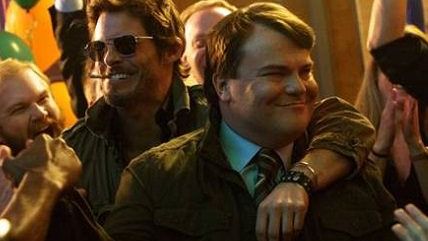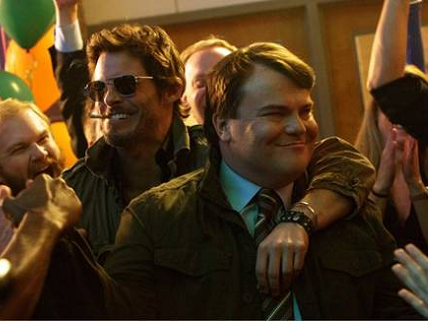Movie Reviews: Maggie and The D Train Are Unexpected Oddities
Arnold Schwarzenegger in a sorrowful zombie film, Jack Black at comedy's far edge.


In the nearly 50 years since George Romero launched the modern zombie movie with Night of the Living Dead, there have been continual attempts to freshen the genre—to keep it going. We've had hard-charging zombies (28 Days Later), comic zombies (Shaun of the Dead), Nazi zombies (Dead Snow), love-bug zombies (Warm Bodies), even zombies as household help (Fido). What's left?
First-time director Henry Hobson and first-time screenwriter John Scott 3 (the name he chooses to use) have come up with a risky new approach. They've pared away the gut-munching and dialed down the horror thrills to present us instead with something like a TV-style disease-of-the-week story involving an affliction called "necroambulism." (As has become common in latter-day zombie films, the word "zombie" is never uttered.) With knowing irony, the filmmakers have cast Arnold Schwarzenegger in the lead role of a heartbroken farmer watching his infected daughter rot away before his eyes, en route to her flesh-rending doom. The thought of a parent witnessing the slow death of a child is inherently wrenching, and we're naturally moved. But over the course of 95 minutes of dim lights, dark clouds, and occasional tragic piano chords, the picture bogs down in its gloomy limitations.
Schwarzenegger's farmer, Wade Vogel, is doing his best to get by in a dystopian world. The plague of necroambulism, for which no cure has been discovered, has turned the country's big cities into disease-ridden horror pits. Wade lives in relative safety in a rambling clapboard house out on the Midwestern plains with his teenage daughter Maggie (Abigail Breslin) and a woman named Caroline (Joely Richardson), who has two small children of her own and is trying to fill the vacant place of Maggie's deceased mother. Why Maggie might want to run off to a nearby city is unclear, but she does and she gets bitten by (let's just say it) a zombie. When Wade comes to retrieve her from a hospital, he's told by a doctor that he can only take her home for eight weeks, at which point she'll begin to "turn." She will then have to be surrendered to authorities for quarantine (a horrific fate, we later learn), and she and her father will be compelled to "say your goodbyes."
Schwarzenegger, with his light, self-deprecating charm, has always been more than a simple action hero. Here, though, in a movie with virtually no action, and little to laugh about, he's forced to rely on basic acting ability—not his strong suit. And the minimal way in which his character is written offers no help. As Maggie's disease progresses, and an ugly lesion on her arm spreads into spidery black veins on her face, Wade has little to do but wander about soul-stricken. We understand his misery, and we're touched, but we wait in vain for more emotional detail. Schwarzenegger's determination to try something new is laudable, but his performance is all in one key, and we keep hoping for modulations that never arrive. This leaves Breslin, an actor of more traditional skills, to keep the movie alive (so to speak) with affecting projections of fear and withering hope.
Motivational clarity is also in short supply here. Wade is determined never to turn Maggie over for quarantine. But since her degeneration is irreversible, and she'll soon pose a lethal threat, we wonder what alternative plan he might have in mind. The script offers no suggestion. (Will he ultimately kill Maggie himself? That would raise other questions.)
The movie is enriched with a number of touching scenes: Maggie giving a farewell kiss to an infected boy (Bryce Romero) on whom she has had a crush; Wade's sudden encounter in a forest with a neighbor and his small daughter, both of them hideously turned. It's the kind of picture that makes you look forward to the novice filmmakers' future projects. This one is mainly a memorable calling card.

The D Train
It's difficult to discuss The D Train without revealing its central plot element: a sex scene, non-graphic but unflinching, that involves…no, I can't. (Hang on till, oh, this afternoon, by which time it'll be common knowledge.) It's not a scene that's been rigged up for showy exploitation—it triggers everything that follows, very little of which is what you might expect. The picture starts out as a sort of bro-com, but it soon creeps over to the dark side, where some fine performances and an array of implausibilities await.
Jack Black, wearing his portliness like a medal from a failed campaign, is Dan Landsman, a pompous bore who's been annoying people in his suburban hometown ever since high school. (He tosses around '90s wisecracks like dated grenades.) Now, 20 years after graduation, he's in charge of the class-reunion committee, in which capacity he's failing to ignite much alumni interest. One night, Dan sees a sunscreen commercial on TV that features Oliver Lawless (James Marsden), the coolest guy in Dan's old class. Unlike Dan, Oliver fled their dead-end town after graduation, and now, Dan assumes, he's become a big-time actor—a star. Dan is certain that luring Oliver to the class reunion would guarantee its success, and maybe garner him some long-sought respect.
In order to finance a trip to Los Angeles to pursue this prospect, Dan concocts a shameless lie for his boss, Bill Shurmur (Jeffrey Tambor), the owner of the struggling consulting company at which Dan works. Dan tells Bill that he has engineered a lucrative business deal in L.A. and needs to fly out there to nail it down. Bill okays the trip, but then insists on coming along. Dan reluctantly agrees to this.
Already we have questions. Since Bill's presence in L.A. will guarantee disaster—he'll immediately realize there's no big deal to consummate—why does Dan insist on sticking to his plan after Bill deals himself in? Also, if Dan feels that face time with Oliver is so important, why doesn't he just spring for a plane ticket himself? The movie's writers and first-time directors, Andrew Mogel and Jarrad Paul, don't appear to care.
In any case, upon arrival, Dan tracks down Oliver—who barely remembers him—and ignores the fact that the onetime class cool guy hasn't really made much of himself as an actor. (Thus his presence in a tacky TV commercial.) There follows a night of gaudy debauchery—pot-smoking, coke-snorting, booze-guzzling and chick-ogling—that leaves Dan shaken and questioning his true desires. Back home again, the big reunion rolls around and everything that could possibly go wrong does so.
Jack Black, who established his non-comedy cred with the 2011 Bernie, is full of squirmy surprises here, playing a man who's off-putting on just about every level, but hard to look away from. And Marsden, such an underrated comic actor, captures Oliver's gone-to-seed hunkiness with irresistible precision. The rest of the cast provides strong support, especially Kathryn Hahn as Dan's uncomprehending wife; Tambor as a man too sweet to realize he's being conned; and Russell Posner as Dan's teenage son Zach (who gets some raw advice from Oliver on the intricacies of a sexual three-way).
The movie's not really a comedy in the usual sense—it's sometimes boldly unpleasant. But it's not a film you're likely to forget a day after seeing it. Whether that's a good thing is another question.


Show Comments (13)